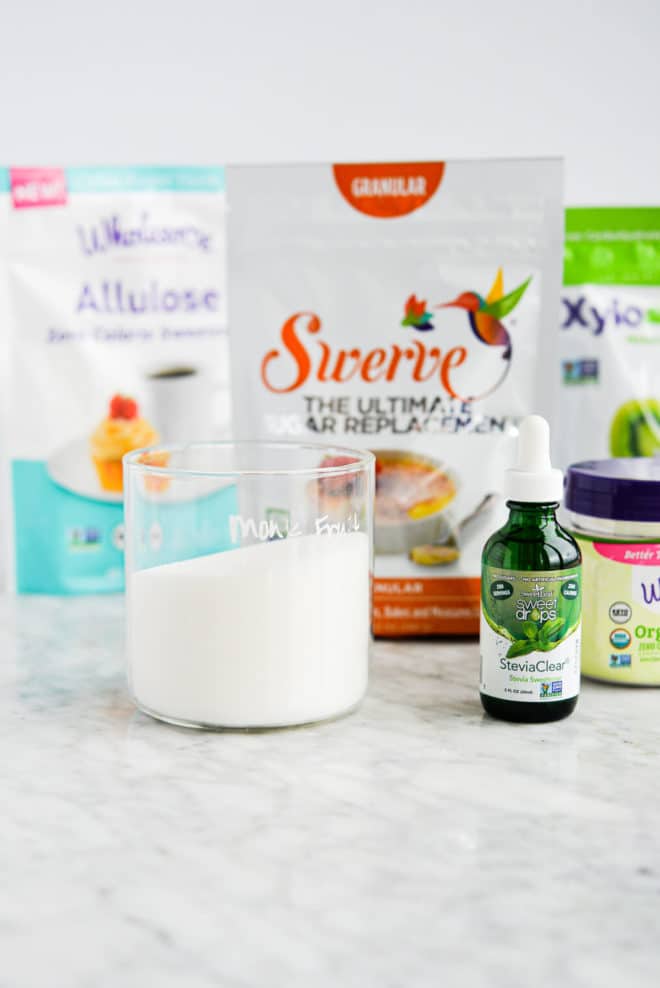
Table of Contents
Whether you need to decrease your sugar consumption to manage a health condition, or you are simply looking to reduce your sugar intake overall, the good news is that the large number of alternative sweeteners on the market makes it easier than ever to do so! However, all those options also means that a trip down the sugar aisle today can be seriously confusing. From natural sweeteners like honey and maple syrup to artificial sweeteners and sugar alcohols, we’re breaking down all of the options to help you determine which is best for you!
Best Natural Sweeteners
We recommend choosing natural sweeteners whenever possible, and luckily, there is a wealth of options! Natural sweeteners are those that are naturally occurring and minimally processed. Sweeteners in this category range from plain granulated white sugar to honey and stevia.
You may have wondered whether sweeteners like coconut sugar or maple syrup are truly healthier than white sugar, and the truth is that, for the most part, they still have the same nutritional impact on the body! However, many natural sweeteners do contain trace amounts of minerals and antioxidants that make them a slightly better choice.
The key to consuming sugar and maintaining health is to limit the amount of sugar you are eating. Just because pure maple syrup is a natural, less-refined sugar doesn’t mean you should be eating it in unlimited quantities! When it comes to sugar, moderation is key.
| Sweetener | Calories | Sugar per Teaspoon | Glycemic Index |
|---|---|---|---|
| Cane Sugar | 15 | 4 g | 65 |
| Coconut sugar | 15 | 4 g | 54 |
| Honey | 21 | 5.7 g | 58 |
| Maple Syrup | 17 | 4.7 g | 54 |
| Date Sugar | 11 | 2 g | 50 |
| Monk Fruit | 0 | 0 g | 0 |
| Stevia | 0 | 0 g | 0 |
| Allulose | 0 | 0 g | 0 |
| Erythritol | 0 | 0 g | 1 |
| Xylitol | 10 | 0 g | 7 |
| Agave Nectar | 23 | 6 g | 17 |
Coconut Sugar
Coconut sugar is made from evaporated coconut tree sap. It is a raw, pure sweetener option that maintains its trace minerals and has a flavor most similar to brown sugar.
Coconut sugar gained popularity a few years ago because it is easy to use as a 1:1 swap for white sugar, and it is lower on the glycemic index than white sugar – meaning it won’t have as big of an impact on blood sugar. Coconut sugar also contains trace amounts of potassium, fiber, iron, magnesium, and trace minerals.
Even though it is lower on the glycemic index, coconut sugar can still contribute to insulin spikes and is best used in moderation. Also, it is important to research your brand of sugar, as some brands can be more highly processed than others.
Best Coconut Sugar Brands
There are many brands of coconut sugar available, but these are my go-to’s:
Honey
Honey is often seen as the original natural sweetener option. While it is most often thought of as a sweetener for tea, it can be used for so much more!
Honey is produced by bees and contains trace minerals, vitamins, prebiotics, and has antibacterial and antibiotic properties. This is one of the reasons people tend to use honey when they are fighting a cold!
Even though it has many great properties, it’s important to note that honey is still high on the glycemic index and should be used sparingly. Overall though, honey is a great choice of sweetener to use occasionally!
Best Brands of Honey
Honey is widely available and we recommend choosing a raw, local honey wherever possible! If you’d prefer to order online, here are a few brands we recommend:
Maple Syrup
Pure maple syrup is an unrefined sweetener that is derived from the sap of maple trees, and is one of my personal favorite natural sweeteners! It is slightly lower than granulated white sugar on the glycemic index, maintains trace minerals like zinc and manganese, and contains up to 24 different antioxidants. When choosing a syrup, make sure you are reaching for pure maple syrup, rather than maple-flavored pancake syrup – the two are very different.
While maple syrup is a great natural sweetener option, it is still sugar and should be used sparingly!
Best Brands of Maple Syrup
Like honey, maple syrup is also widely available, and if you live in an area where it is produced, we recommend buying local! If you’d like to buy online though, here are a few brands to try:
Date Sugar and Syrup
Dates are a naturally sweet fruit. Date syrup is made from cooked down dates and has a unique, complex flavor. For date sugar, dates are dehydrated and ground up to resemble regular sugar. Date syrup and sugar are sweeter than typical table sugar, so be aware that you only need about 75% as much as you’d normally use.
One reason we love date sugar and syrup is that they are made from just one ingredient – dates – and are not typically highly processed. These options are also lower on the glycemic index than white sugar and rich in dietary potassium, fiber, iron, magnesium, and trace minerals.
A few drawbacks to using date sugar and syrup is that they contain less of the fiber present in whole dates which helps to slow the absorption of glucose and decrease blood sugar spikes. Even though this is an all-natural sweetener sourced from fruit, it is still fairly high in sugar and should be used in moderation.
Best Date Sugar
Personally, I am partial to The Date Lady’s date products! Both her date sugar and date syrup are delicious.
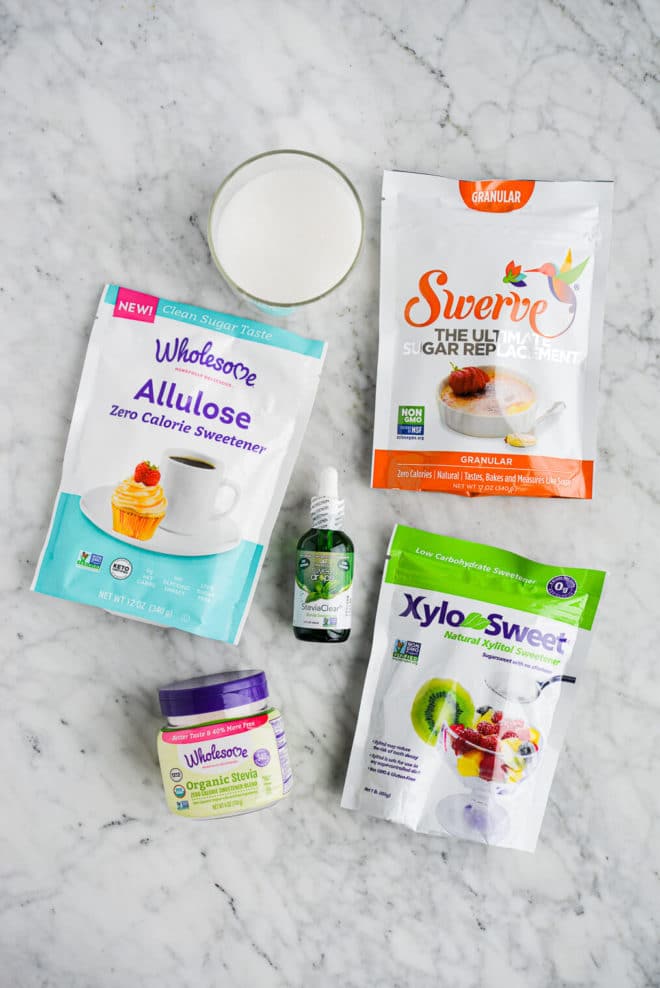
Monk Fruit
Monk fruit is a zero-calorie sweetener that is naturally derived from the Lo Han Guo fruit and is typically less chemically processed than stevia. Amazingly, it is up to 100-200x sweeter than white sugar!
Since this sweetener is zero-calorie, it will not spike your blood sugar the way that granulated white sugar typically would. It also contains powerful antioxidants called mogrosides, and there are no known negative side effects of consuming monk fruit.
When buying monk fruit powder, you will see that it is often combined with dextrose or erythritol to tone down its extreme sweetness, so definitely read the labels before you buy it.
Overall, we think that monk fruit is a great choice for a natural, zero-calorie sweetener. However, we still recommend limiting your consumption of monk fruit, because regularly eating highly sweetened foods may still encourage daily sugar cravings.
Best Monk Fruit
There are a ton of monk fruit options on the market, but my favorite is Lakanto, which is a combination of erythritol and monk fruit. If you’re looking for monk fruit without erythritol, but find pure monk fruit powder to be too sweet, this Besti Monk Fruit and Allulose Blend may be a good option. If you’d like to try 100% monk fruit, you can try this monk fruit extract powder.
Stevia
Stevia has grown significantly in popularity in the past several years. It is a zero-calorie sweetener that comes from the leaf of the plant stevia rebaudiana and is naturally about 250-350 times sweeter than white sugar.
Since it is sugar-free, stevia won’t spike your blood sugar in the way that white sugar typically will. In fact, there is evidence that stevia may be an insulin sensitizer that can aid in glucose tolerance. Additionally, stevia has been used as a natural sweetener for centuries!
The biggest drawback to stevia is that much of the stevia on the market is highly processed into powder and liquid forms and brands like Truvia and Stevia in the Raw are mixed with erythritol (which can cause digestive upset in some people) and dextrose, while other brands can contain ingredients like cornstarch and maltodextrin.
If you are choosing to use stevia as your preferred form of sweetener, be sure to check the label to find the one with the least ingredients!
Best Stevia Brands
My favorite Stevia option overall is NOW Organic BetterStevia Liquid. I find it is perfect for sweetening my coffee. NOW’s powdered BetterStevia is also a good option, but does contain inulin. For powdered stevia, NuStevia’s Organic Powdered Stevia is my favorite option. It looks and feels more like sugar and is one of few brands that contain no sugar!
Allulose
Allulose is a newer sweetener on the market that has gained popularity alongside the Keto diet. It is known as a “rare sugar” because it occurs naturally in only a few foods like figs, jackfruit, and raisins, but it is now being made from corn. Allulose has only 1/10th of the calories of sugar and is about 70% as sweet, with a taste very similar to that of sugar with virtually no aftertaste.
What makes allulose unique is that it is actually a sugar, but because of its chemical makeup, the body absorbs it differently than glucose and fructose. About 70% of allulose is absorbed directly into the bloodstream from the small intestine, and the other 30% goes through the digestive process. In both cases, the body doesn’t metabolize a significant amount of it – meaning most of the calories and sugar are fully excreted (3). Because of this, allulose also has virtually no effect on blood sugar.
This is similar to how sugar alcohols work, but in the case of allulose, it also isn’t fermented in the gut – which means it is far less likely to cause digestive upset than sugar alcohols are.
Another benefit of allulose is that since it is technically a sugar, it behaves similarly to table sugar – meaning it can work as a great 1:1 replacement for baking and in sauces.
Overall, allulose is a great option for those who are looking to avoid sugar but would still like the occasional sweet treat. The only drawbacks we’ve seen so far are that it is a newer sweetener option that is still being researched and that it is currently on the more expensive side due to limited production.
Best Allulose Brands
Since allulose is a newer sweetener, there aren’t a ton of brands producing it yet. So far, I’ve had success with Wholesome’s Allulose, which was available at multiple stores in my area. For a more cost-effective option, you may want to give Anthony’s Allulose a try.
Sugar Alcohols
Sugar alcohols have gained popularity in recent years because they taste very close to regular sugar, but contain fewer calories. Despite their name, sugar alcohols don’t actually contain any alcohol.
Sugar alcohols are naturally occurring in fruits and vegetables, but the ones that you see on the shelves are most often processed from other sugars. A common way to create a sugar alcohol is to isolate the glucose found in cornstarch and ferment it with yeast.
The reason sugar alcohols have fewer calories than regular sugar and don’t spike blood sugar is that they are mostly resistant to digestion. When you look at the nutrition facts for sugar alcohols, you’ll see that they are high in fiber. Sugar alcohols can actually have a prebiotic effect and feed the good bacteria in your gut, but they can also cause digestive upset in many people – especially when consumed in large quantities. Because of this, we recommend limiting your intake of sugar alcohols and avoiding them altogether if you suffer from IBS or are sensitive to FODMAPs.
Overall, sugar alcohols can be a good choice for those who need to avoid sugar altogether, such as diabetics, who don’t enjoy the taste of stevia or monk fruit, and who don’t have a history of digestive issues. As with all sweeteners, though, I recommend consuming this one in limited quantities – especially when first testing it out!
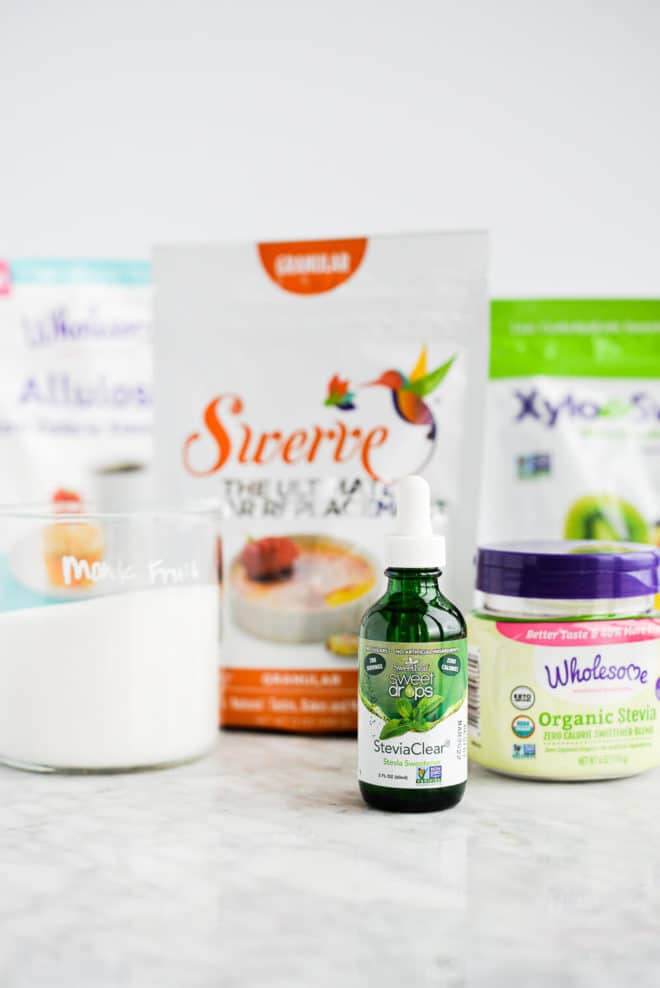
Best Sugar Alcohols to Use
There are many types of sugar alcohols on the market, including sorbitol, maltitol, and mannitol, but these are the two we recommend most.
Erythritol
Erythritol is becoming increasingly common as a sugar replacement, and for good reason! It contains fewer calories and less sugar than other sugar alcohols, and overall, contains only 6% of the calories of sugar while being only slightly less sweet. Erythritol tastes close to regular sugar, but you may notice that it causes a sort of cooling effect in your mouth after eating.
Besides being low in calories and sugar, erythritol is also a preferred sugar alcohol because it has been found to be easier to digest than others. This is because only about 10% of erythritol actually enters the digestive tract, the other 90% is absorbed directly into the bloodstream(1). However, you may still have digestive symptoms when eating erythritol in high quantities.
One thing to watch out for when buying erythritol or erythritol-sweetened products is to make sure it doesn’t contain other artificial sweeteners. Since erythritol isn’t as sweet as sugar, artificial sweeteners are often added to boost sweetness.
Best Brand of Erythritol
My favorite brand of erythritol is Swerve. It works really well in baked goods and comes in granulated, powdered, and even brown sugar forms. Swerve is on the more expensive side though, so if you’re looking for a cheaper option, I’d try Anthony’s.
Xylitol
Xylitol is another sugar alcohol derived from birch wood and corn that is most well known for its potential benefits for dental health. It is most often used as a sweetener in gums, mouthwash, and other dental hygiene products but can be used as a sugar replacement as well.
Xylitol has 40% less calories than regular sugar, and is about the same sweetness. It also has been shown to have little effect on insulin levels (2), so it can be a good choice for diabetics.
About 50% of xylitol is absorbed directly into the bloodstream, while the other 50% passes through the digestive tract. Because of this, xylitol is more likely to cause gastrointestinal problems than erythritol. Another caution about xylitol is that it is toxic to dogs, so if you have any xylitol-sweetened treats, be sure to keep them away from your pups!
Overall, xylitol is a good sugar substitute for occasional use. If you are going to try it, I’d recommend testing a small amount to make sure you can tolerate it!
Best Brand of Xylitol
In the past, I’ve tried and liked XyloSweet Xylitol and liked it, plus it was easy to find at my local grocery store. If you’re looking for xylitol sourced only from birch, I’d try HealthGarden’s Birch Xylitol.
Sugar Substitutes to Avoid
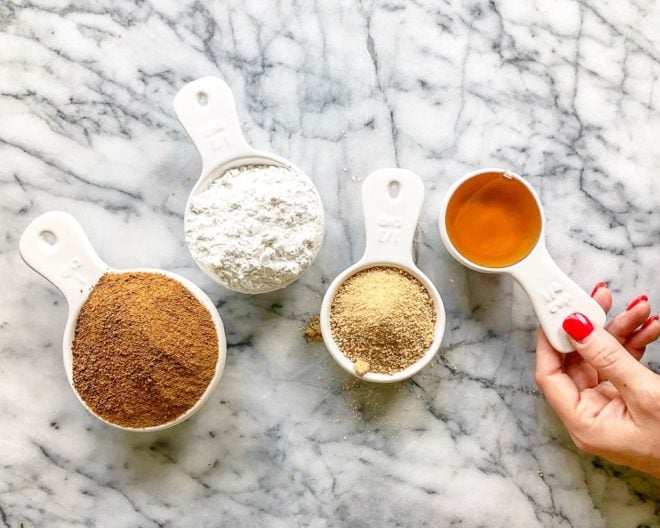
Now that we’ve covered our favorite sugar substitutes, let’s talk about a few to avoid.
Artificial Sweeteners
The first group we recommend avoiding is artificial sweeteners. These sweeteners contain zero calories and are incredibly sweet. You’ll most often find these used to sweeten diet sodas and packaged products. There have been reports about artificial sweeteners causing cancer, but these reports have been unfounded. Nonetheless, we recommend avoiding these sweeteners as they can cause headaches and stomachaches in some people, and because there are so many great natural sweetener options out there to choose from instead! Here is a list of artificial sweeteners and their brand names:
- Acesulfame potassium, also known as Ace-K (Sunett)
- Aspartame (NutraSweet or Equal)
- Neotame (Newtame)
- Sucralose (Splenda)
- D-Tagatose (Sugaree)
- Saccharin (Sweet’N Low)
Agave Nectar
Agave syrup comes from the agave plant, which is also used to make tequila. Agave sap is naturally high in fiber from fructans, which can be beneficial to the body, but those fructans are broken down into fructose during the refining process that converts the sap into the syrup form we most often see agave in.
Agave has been touted as a healthier natural sweetener option because it has a lower glycemic index than cane sugar. However, it is also much higher in fructose than cane sugar. Regular sugar is made up of 50% fructose and 50% glucose, whereas agave is 85% fructose. This is important because of the way that the body processes fructose. Every cell in your body is able to break down glucose, but fructose must be broken down by the liver and converted into glucose in order to be fully absorbed, which puts excess stress on your liver. Excess fructose consumption has been linked to obesity, diabetes, and non-alcoholic fatty liver disease(3).
While the occasional serving of agave nectar is unlikely to really impact your health, we don’t recommend consuming it on a regular basis for the reasons outlined above, especially when there are so many other great natural sweetener options available!
High Fructose Corn Syrup
High fructose corn syrup (HFCS) is widely used to sweeten processed, packaged foods and soft drinks. It is made from corn, which can often be cheaper than using regular sugar. HFCS ranges from 55-90% fructose, which is more difficult for your body to process. It has been shown to increase appetite, promote obesity, and contribute to inflammation, high triglycerides, diabetes, and more (4). We recommend looking at the labels when buying packaged goods and avoiding this sweetener whenever possible.
So, what’s the right sweetener for me?
Now that you know all of the options available to you, the next step is to determine what the best sweetener is for you! I recommend first thinking about what your individual needs are.
If you are simply looking for a healthier sweetener option or to cut down on sugar a bit, one of the natural sweeteners like coconut sugar, maple syrup, or honey may be a good option for you. If you are diabetic or eating a low-carb diet, a sugar-free sweetener like stevia or monk fruit, or a sugar alcohol like erythritol will be better options for you. If you struggle with digestive issues, then you are probably better off avoiding sugar alcohols. I hope that this overview of sweetener options has given you some clarity and helped you determine which is right for you!
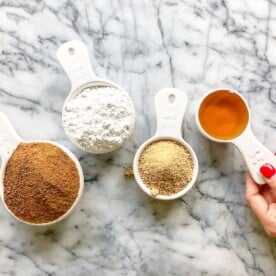
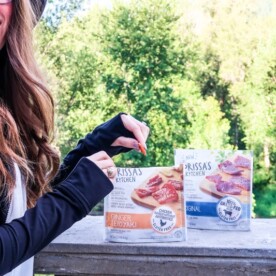
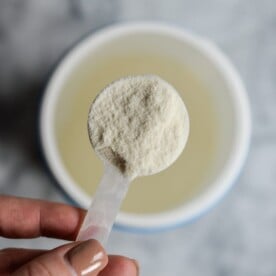

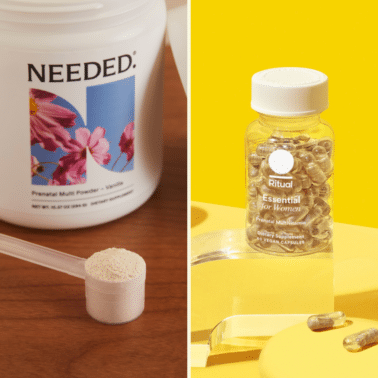

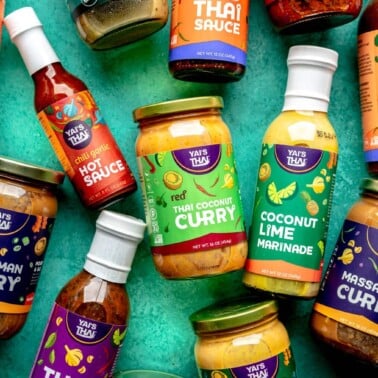
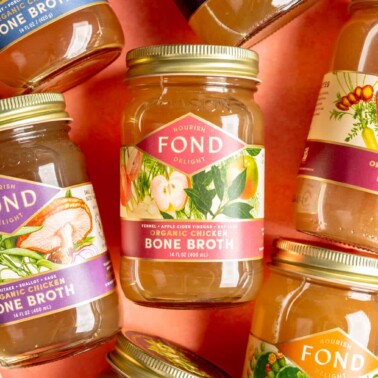








This is a great article, thank you for compiling it, I learned a lot!
We’re so glad, Liz!!
Great article. I am diabetic and have used Splenda for years and I don’t like the aftertaste. The information provided will help me make a change going forward. Thank you!
SO glad you found this helpful, Denise!!